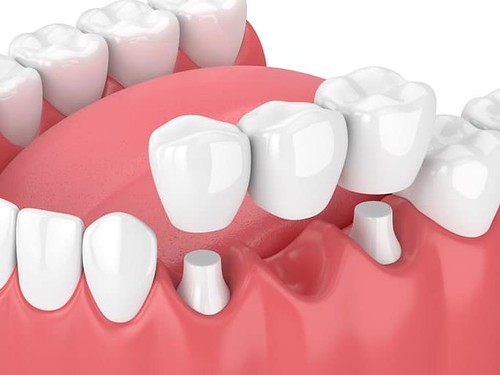Is your smile not what it used to be? Both bridges and implants can improve the look and feel of your smile and can even bring back the functionality you thought you lost.
What Are Dental Bridges?
A dental bridge can transform your smile by replacing one or more missing teeth. They’re strong enough to replace incisors, canines, and even molars as long as there are adjacent healthy teeth to serve as anchors. Bridges also come in a variety of materials but are most often made of porcelain or ceramic to mimic the natural color and feel of your teeth.
A dental bridge comprises three main parts: a prosthetic tooth, called a pontic, and two attached crowns to be fitted over your existing healthy teeth. These connected pieces “bridge” the gap left by your missing tooth. Once it’s cemented, it’s permanent, and your ability to chew, speak, and rest your jaw comfortably should improve.
What Are Dental Implants?
According to the American College of Prosthodontics, an estimated 120 million Americans are missing at least one tooth. If you’re someone who has experienced tooth loss, dental implants might be the right fit to fill the space. Like a dental bridge, implants are comprised of three main parts:
- The implant, which is screwed into the jaw to serve as the root of your replacement tooth.
- The abutment, which permanently supports the new tooth or teeth.
- The crown, or prosthetic tooth, that’s visible above the gum line, which is typically made with porcelain to remain durable and to mimic the look and feel of a real tooth.
How Are Bridges and Implants Used?
Despite their similarities, dental bridges and dental implants are used for different reasons. Unlike bridges, dental implants don’t have to rely on neighboring healthy teeth for support. Because they’re screwed directly into the jaw, they can stand on their own to replace a single tooth. However, implants require specific jaw bone density for bone grafting, which makes this procedure unsuitable for heavy smokers or drinkers.
On the contrary, dental bridges can permanently repair your smile in just two dental visits without being screwed into your jawbone. At the first appointment, your dentist will prepare your anchor teeth, take dental impressions, and cement a temporary bridge while you wait for the lab to create your custom fit. Then, at your second appointment, the dentist will ensure a comfortable fit of the permanent bridge before cementing it in place. Once it’s set, you and your new smile are ready to take on the day.
How Can They Improve a Smile?
Both dental bridges and implants can improve your smile and restore functionality. Once you and your dentist decide on the best option, you can look forward to eating foods you love, speaking more clearly, breathing easier, and restoring your face shape.
If you suffer from damaged, missing, weakened, or chipped teeth, Carolina Family Dentistry can help you restore your smile and improve your well-being.








